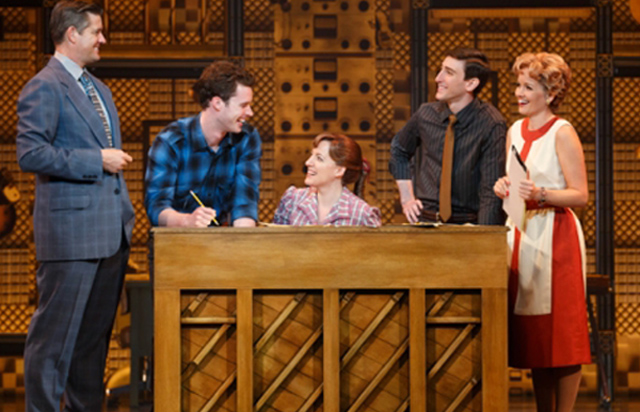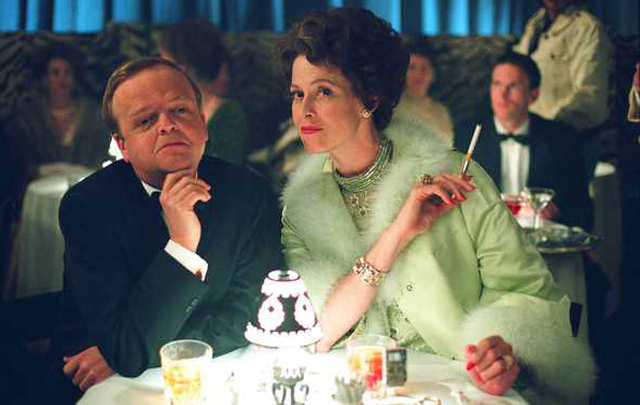CHICAGO – Patrick McDonald of HollywoodChicago.com appears on “The Morning Mess” with Dan Baker on WBGR-FM (Monroe, Wisconsin) on March 21st, 2024, reviewing the new streaming series “Manhunt” – based on the bestseller by James L. Swanson – currently streaming on Apple TV+.
Interview: Douglas McGrath of ‘Beautiful: The Carole King Musical’
CHICAGO – While a musical stage play is known for its songs rather than dialogue or story, all has to be created. And the playwright for the opening-in-Chicago “Beautiful: The Carole King Musical” is veteran actor, director and scribe Douglas McGrath. ‘Beautiful’ opens December 1st, 2015, at the Oriental Theatre in Chicago.
“Beautiful” is a so-called jukebox musical with a twist. It takes the tunes of singer/songwriter Carole King, but integrates them within the story of Ms. King, who rose from a teenage song creator to a pop artist in her own right (“Tapestry” was her million seller album). The poignancy, in both the good and not-so-good times, are all told in the musical, which was crafted by Douglas McGrath.

Scene From ‘Beautiful: The Carole King Musical,’ book by Douglas McGrath
Photo credit: Broadway in Chicago
McGrath is a hybrid, having written screenplays, acted in films and directed. He began his writing career on “Saturday Night Live” in the infamous season of 1980-81, after the original cast and producer had left the show. From there it was nothing but one success after another, including a co-writing credit with Woody Allen on the Oscar-winning “Bullets Over Broadway.” He had been no slouch as a film director, having guided “Emma” (1996), “Infamous” (2008) and the HBO documentary “His Way” (2011, about producer Jerry Weintraub). He also writes political commentary for “The New Republic” magazine.
Douglas McGrath was at the press introduction for “Beautiful” in April of 2015, and he “told all” to HollywoodChicago.com about his participation in the show business game.
HollywoodChicago.com: The legacy of Carole King is also the history of 1960s/70s pop music. How did you want to honor that history in associated with Ms. King?
Douglas McGrath: When you see the show, the first thing you learn is that it’s the story of Carole King’s life. The second thing you learn is that her life is the history of pop music from the late 1950s through the ‘70s. Her life in a sense was the history of the changes in popular music. She started with the girl groups in the early 1960s, went through to individual artists like Aretha Franklin later in the decade, and finally wrote for herself as a singer.
HollywoodChicago.com: Where did you want to strike the balance between a jukebox musical and a real story, and since the jukebox musical has evolved, which one of them did you want for a blueprint for the musical?
McGrath: I always thought of this as a traditional musical. If ‘jukebox’ means we’re using songs from someone’s catalog, then yes it can be categorized that way. It’s different from a traditional musical only in the sense that the songs are not sung directly to another person as an expression of their feelings. In our show, everyone comes in and says, ‘I wrote this song, do you want to hear it?’ It’s just part of what they were creating and part of their lives.
I think the important thing about doing it this way is that it allows the audience to hear those songs differently, as a personal expression of the real people they are seeing on stage. They become like character songs, because you see the characters who wrote them.
HollywoodChicago.com: In putting together the stories in the musical, you met and interviewed all the major players around Carole King, including her writing partner and first husband Gerry Goffin, in addition to the songwriting team of Barry Mann and Cynthia Weil. What personal stories were you able to get that amplified the Carole King story?
McGrath: Well, I got facts, but I hope that also I got the essence in each of these people. I was sitting with them for several days, and I got to know what they were really like – through their stories and manner, you kind of get a sense of who they are. Barry and Cynthia and Carole and Gerry were highly competitive with each other. Both teams wanted the number one record, but if one team couldn’t get it, they wanted the other team to attain it. They’ve been friends through all those years.
Gerry and Carole had a difficult marriage, they would both tell me that. When Gerry told his version of it, it wasn’t any different from Carole’s version. He didn’t cover up anything or make excuses, which I found very interesting. That’s why they stayed friends.

Scene From ‘Infamous,’ Directed by Douglas McGrath
Photo credit: Warner Home Video
HollywoodChicago.com: You participated in a little history by working as a writer on ‘Saturday Night Live’ during it’s infamous transition period in 1980-81…
McGrath: What I call incontestably the worst season in ‘SNL’ history. [laughs]
HollywoodChicago.com: What was the greatest panic of that period, and what was its greatest transitional triumph?
McGrath: The greatest panic of course, is that we were going to kill the show, that it wouldn’t survive the transition. The greatest transitional triumph was in that cast Eddie Murphy was discovered. It showed everyone that if we just held on, everything would be all right.
HollywoodChicago.com: When it felt like it might die, what was the atmosphere surrounding the writers and producers?
McGrath: There were two levels of anxiety, first what the writers and performers were going through working on the show. – the immediacy of putting on a show every week. At the network level, it was about the audience abandoning the show. So producer Jean Doumanian – who replaced Lorne Michaels the first time – was under a lot of pressure, and was eventually fired.
Jean liked to fire writers, so there was that hanging over us, and this was my first job out of college. Then Dick Ebersol replaced her as producer when she was fired, and when he came in he fired half of the writing staff. I survived, but then the Writers Guild went on strike. After that was over, I was laid off, but they kept Joe Piscopo and Eddie Murphy in the cast.
HollywoodChicago.com: You famously collaborated with Woody Allen on ‘Bullets Over Broadway.’ What was the origin of that collaboration and what do you think you contributed to the Allen legend with that film?
 Writer/Director/Actor Douglas McGrath Photo credit: Douglas McGrath |
McGrath: I had met Woody and knew him socially. My wife Jane, who wasn’t my wife at the time, had worked with Woody as an assistant and eventually an associate producer. She stopped working for him, and then we started dating, so we would go out to dinner with him. He asked Jane if she thought I would like to write a movie with him. She told him, ‘I think so, but I’ll check.’ I was working in California when she called me with the news, and the next 20 minutes was me saying, ‘Are you joking? That would be mean.’ It was the greatest writing class I’ve ever had. And he never lorded himself over me, it was true collaboration.
I think, however, I’ve contributed nothing to the Allen legend. [laughs[ What I will say honestly is that when people see that film, they often say it doesn’t feel like Woody’s other movies, so they assume it was because of me…but it wasn’t. I know from being there, that everything in it was Woody – meaning he approved every line. The main thing I did was guide us towards certain ideas, rather than other ideas we were considering.
HollywoodChicago.com: Your film ‘Infamous’ was somewhat overshadowed by ‘Capote’ [both films explored the same incident in Truman Capote’s life, and were released a year apart]. What twist of legacy for Truman Capote do you think ‘Infamous’ has that the ‘Capote’ doesn’t?
McGrath: I think what my film has is the belief that Capote’s relationship with Perry Smith, which was essential to the success of ‘In Cold Blood,’ led to his mental and physical undoing. It was my premise – which was my own – that this was the case. I have no document to prove it, but I believe he fell in love with Perry Smith.
I believe Capote witnessing Smith’s execution, before he completed the book, shattered something essential inside him. He was never the same after that, because up to and including the publication of ‘In Cold Blood’ he just kept rising upward. After that, it was down, down, down. There is a line in the movie…’alcohol and suicide are not for the faint of heart.’ That is what his demise was about in many ways.
 | By PATRICK McDONALD |


